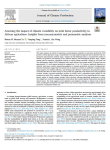Bernard B.M., Song Y., Sumiati,, Wang X. (2025). Assessing the impact of climate variability on total factor productivity in African agriculture: insights from non-parametric and parametric analyses. Journal of Cleaner Production, 01/07/2025, vol. 513, p. 145549.
https://doi.org/10.1016/j.jclepro.2025.145549
https://doi.org/10.1016/j.jclepro.2025.145549
| Titre : | Assessing the impact of climate variability on total factor productivity in African agriculture: insights from non-parametric and parametric analyses (2025) |
| Auteurs : | B.M. Bernard ; Y. Song ; Sumiati, ; X. Wang |
| Type de document : | Article |
| Dans : | Journal of Cleaner Production (vol. 513, July 2025) |
| Article en page(s) : | p. 145549 |
| Langues : | Anglais |
| Langues du résumé : | Anglais |
| Catégories : |
Catégories principales 07 - ENVIRONNEMENT ; 7.6 - Changement ClimatiqueThésaurus IAMM CHANGEMENT CLIMATIQUE ; EVALUATION DE L'IMPACT ; PRODUCTIVITE ; RENDEMENT DES CULTURES ; AGRICULTURE ; AFRIQUE |
| Résumé : | This study examines the effects of temperature and precipitation variability on total factor productivity (TFP) growth in African agriculture using a comprehensive two-stage analytical approach that incorporates both non-parametric and parametric methods. Stage 1 employs the DEA Malmquist index, a non-parametric method, to estimate TFP growth by decomposing it into technical efficiency and technological progress. Stage 2 applies dynamic panel IV regression, a parametric method, to evaluate climate variability's impact on TFP trends. The Data Envelopment Analysis (DEA) Malmquist index results indicate that average annual TFP growth rate was approximately 2 % with regional productivity ranging from 1 % to 4 %. However, significant disparities are observed, with many countries experiencing stagnation or minimal productivity increases. Decomposed productivity determinants suggest that low growth rates in numerous countries are attributed to minimal technological progress, low technical efficiency, and declining scale efficiency. Furthermore, the parametric analysis reveals that the effects of climate change on TFP growth vary significantly with climate factors and geographical locations. Notably, long-term temperature increases are found to have a substantial negative impact on TFP growth across much of the continent. The findings underscore the need for more region-specific and country-specific studies to identify extreme weather factors adversely affecting agricultural productivity in Africa. Such insights are crucial for formulating policy interventions that consider regional characteristics and specific climate factors. The study suggests several adaptation and mitigation strategies to enhance food security in Africa, including the development of drought-tolerant crop varieties, improvements in irrigation systems, and the promotion of sustainable fertilizer use. |
| Cote : | Réservé lecteur CIHEAM |
| URL / DOI : | https://doi.org/10.1016/j.jclepro.2025.145549 |







